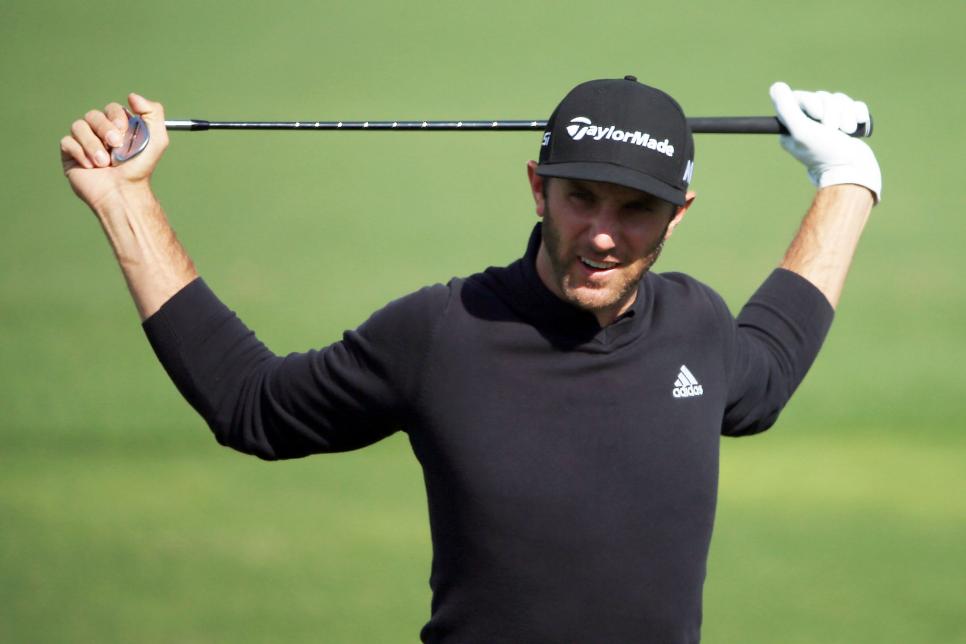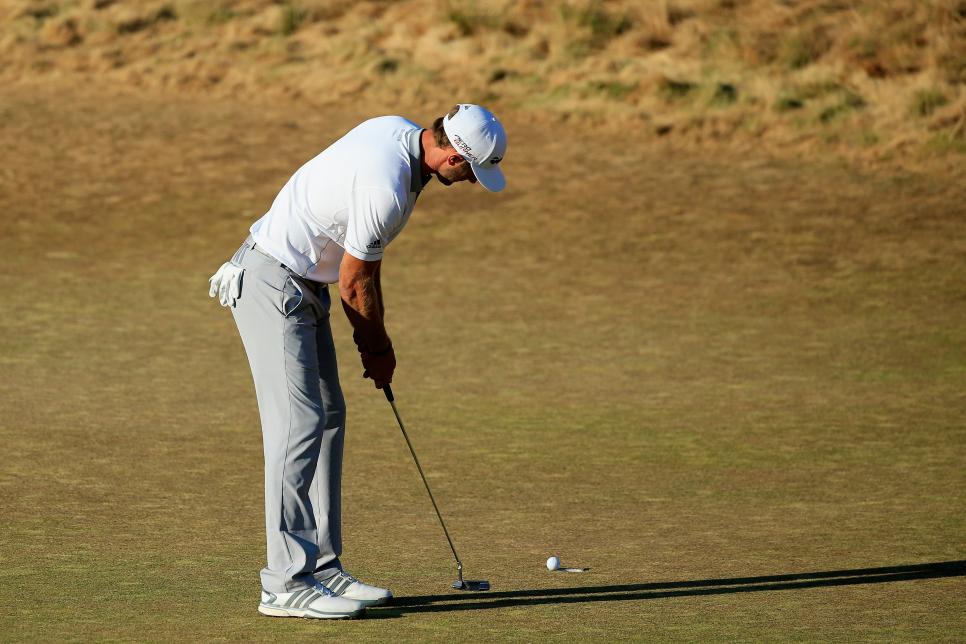The Loop
Dustin Johnson doesn't overcomplicate golf, for better or worse

2016 Getty Images
Will Dustin Johnson ever win a major? Physically, the 6-foot-4, 200-pound Johnson is a freak, as comfortable dunking a basketball or shredding laps in the pool as generating clubhead speed north of 120 mph and ball speed over 180 mph. His iron play is crisp and he can work the ball all ways. Johnson's mental game is another question. To know Johnson is to know a golfer who isn’t terribly reflective. He will never be confused for someone who is analytical or lost in deep thought, on or off the golf course. Recently, he bought a new boat named “Just Chillin.” His standard greeting is often, “Yo, bro.” There was also this from Phil Mickelson earlier this year at Augusta National, where Bryson DeChambeau and Mickelson were discussing the physics of putting: “(Bryson) was using some pretty scientific terms and Dustin kind of shook his head and he said, ‘If I hang around you guys much longer, I'll never break 100,’” Mickelson said. Talking about the annual Champions Dinner at the Masters, Mickelson wasted no time taking another friendly jab at Johnson. “We were walking down 1, and I just said, ‘So, what are your plans tonight?’" Mickelson said. “Might have been a little too subtle for Dustin.” That Johnson doesn't overcomplicate the game can be one of his great assets. As often as bad shots and bad rounds can leave scar tissue with golfers, Johnson is remarkably unburdened, even in the wake of some notable mistakes in big moments. There was the three-shot lead going into the last day at Pebble Beach in 2010 and subsequent 82; the bunker that wasn’t a bunker later that summer at Whistling Straits; the ball out of bounds on 14 at Royal St. George’s when he trailed by two late Sunday of the 2011 Open Championship; the three-putt from 15 feet on the 72nd hole of last year’s U.S. Open at Chambers Bay. “Some of the screw-ups can mess with your head,” says coach Butch Harmon, who began working with Johnson in 2010. “But he has the ability to put it behind him. He’s been that way his whole life.” See ball. Hit ball. Repeat. It really is that simple for Johnson, he says, and it's a big part of why he has totaled nine career wins in 191 starts, a pace that has been outdone by only Tiger Woods, Rory McIlroy, Phil Mickelson and Vijay Singh in that same span. He is also one of only four players to have won each of his first eight seasons on tour. The others are Arnold Palmer, Jack Nicklaus and Woods. The difference of course between Johnson and those other names is they have all won multiple majors while Johnson has been stuck on zero, on more than one occasion fumbling his chances like a wet water balloon on a hot summer day. That’s the thing about Johnson’s close calls -- they have gone splat in epic fashion. And as much as Johnson doesn't dwell on his mistakes, there's a chance he also doesn't learn from them. The closer the ball gets to the hole, the more it’s about the mind than the body. To that end his short game has never quite matched up with the other parts. His weekend scoring average is also more than a stroke higher than over the first two days. “He’s got to learn to close on Sundays a little better,” Harmon says. “He’s a very aggressive player and sometimes on Sunday he’s too conservative. He’s trying too hard to make it happen too much sometimes. “It’s more a mental thing than it is a physical thing.” Which is perhaps why Johnson has always leaned toward the less-is-more approach when it comes to those around him. His workouts with fitness coach Joey Diovisalvi are simple but focused and efficient. When Harmon’s son Claude began working with Johnson more often because the two live near each other in South Florida, his inclination was to get his client to think more on the golf course. He quickly discovered that approach doesn’t really work and that it would be detrimental. And when it comes to his caddie and younger brother Austin, now in his third year on the bag and an accomplished golfer in his own right who also played basketball at Charleston Southern, the approach isn’t any different. Austin is responsible for yardage, wind and conversation. That’s it. “Rounds when I’m not playing good is when I’m thinking too much instead of just playing golf,” Johnson said. “Days when I’m playing good, I’m focused but not thinking too much. “And if I’m asking for too much advice from my caddie, something’s not going right. He does the numbers but everything else I control.” Given Johnson’s overall success -- 21 finishes in the top three and more than $32 million in career earnings -- it’s hard to argue that it hasn’t worked to an extent. “He’s the Forrest Gump, from the standpoint of you tell him to run that way, he goes, ‘OK, I’ll run that way,’” Claude Harmon said. “If you could design an athlete from start to finish, a golfer, you wouldn’t design one that was super intelligent, introspective and a thinker. You’d design a golfer that doesn’t really know a lot, that is a freak athlete and has the ability to not be affected. “Nobody could come back from what Dustin has had to come back from. Everyone wants him to have this breakdown, this moment. He just keeps saying, ‘I can’t change what happened.’ So his approach is why spend any energy thinking about what he can’t change?”

Getty Images
To the former, Johnson seemed to let last year’s U.S. Open loss roll off his back fairly quickly. An hour or so later instead of beating himself up, he was the one loading the luggage of his fiancée Paulina Gretzky and her parents Wayne and Janet into the cars at their rental house before they jetted off for a family trip. “It wasn’t like I did anything bad or made any mistakes,” Johnson said of his final-hole three-jack at Chambers Bay. “With the conditions there, the greens as fast and bumpy as they were, it was so difficult. You can hit a good putt and they don’t go in, so it was easy for me to not let it bother me. The first putt was supposed to break right and it started bouncing instead of falling with the hill. The second one, I hit it where I wanted. I felt like it just hobbled left on me. “It wasn’t like it was my last tournament I’m gonna play. If I keep playing the way I’m playing and keep putting self in that position I will get it done.” A month later at St. Andrews it looked like he would, beating the Old Course into submission over the first 36 holes and reaching 10 under to take the lead. But like so many times before, his game inexplicably vanished. Johnson closed with a pair of 75s and tied for 49th. Will Johnson ever win a major? “The law of averages tell you that if you continue to hang out there something’s gonna give,” Claude Harmon said. “Sooner or later, the other guy’s gonna be the one to mess up.”